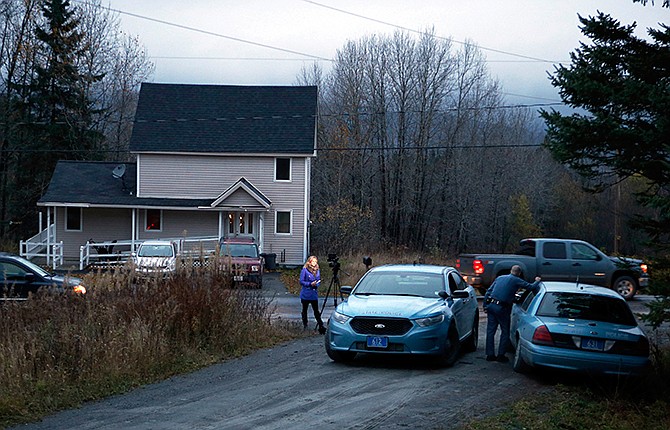FORT KENT, Maine (AP) - A nurse who treated Ebola patients in West Africa vowed on Wednesday to end her voluntary quarantine, even going so far as to step out of her home and shake a reporter's hand, signaling a showdown with state police monitoring her and state officials seeking to legally enforce her confinement.
Kaci Hickox broke her quarantine by stepping outside with her boyfriend and speaking briefly to reporters Wednesday night. State and local police could only watch from across the street because a judge hadn't signed off on a court order sought by state health officials.
Hickox, who has shown no symptoms of Ebola, told NBC's "Today" show and ABC's "Good Morning America" earlier that she planned to defy the state's voluntary quarantine.
"I remain appalled by these home quarantine policies that have been forced upon me even though I am in perfectly good health," Hickox said on "Today."
One of her lawyers, Norman Siegel, said she isn't willing to cooperate further unless the state lifts "all or most of the restrictions." But state officials continued to assert that she should remain in isolation until Nov. 10, the end of the 21-day incubation period for Ebola.
A judge would have to grant the state's request in what could serve as a test as to the legality of state quarantines during the Ebola scare.
Until an order is signed by a judge, state police will monitor Hickox's movement and interactions if she leaves her home but can't physically detain her, said Department of Health and Human Services Commissioner Mary Mayhew.
Generally, states have broad authority when it comes to such matters. But Maine health officials could have a tough time convincing a judge that Hickox poses a threat, said attorney Jackie L. Caynon III, who specializes in health law in Worcester, Massachusetts.
"If somebody isn't showing signs of the infection, then it's kind of hard to say someone should be under mandatory quarantine," he said.
Ebola, which is spread through direct contact with the bodily fluids of an infected person, has killed thousands of people in Africa, but only four people have been diagnosed with it in the United States. People can't be infected just by being near someone who's sick, and people aren't contagious unless they're sick, health officials say.
Guidelines from the federal Centers for Disease Control and Prevention recommend monitoring for health care workers like Hickox who have come into contact with Ebola patients. But some states, including Maine, are going above and beyond guidelines.
Hickox, who volunteered in Sierra Leone with Doctors Without Borders, was the first person forced into New Jersey's mandatory quarantine for people arriving at the Newark airport from three West African countries. Hickox spent the weekend in a tent in New Jersey before traveling to the home of her boyfriend, a nursing student at the University of Maine at Fort Kent.
"I am not going to sit around and be bullied by politicians and forced to stay in my home when I am not a risk to the American public," she said.
Gov. Paul LePage commended all health care workers who have volunteered in Africa to treat Ebola patients. But he said the state must be "vigilant" to protect others.
Maine law allows a judge to grant temporary custody of someone if health officials demonstrate "a clear and immediate public health threat."
The state's court filing was expected late Wednesday or early Thursday, officials said. If a judge grants the state's request, then Hickox will appeal the decision on constitutional grounds, Siegel said.
"Our position is very simple: There's no justification for the state of Maine to quarantine her," he said.
Hickox made her point when she stepped outside the home and shook the reporter's hand before going back indoors.
"You could hug me," Hickox said, according to the Portland Press Herald. "You could shake my hand. I would not give you Ebola."
Associated Press writers David Sharp in Portland and Alanna Durkin in Augusta contributed to this report.
Related video report:

